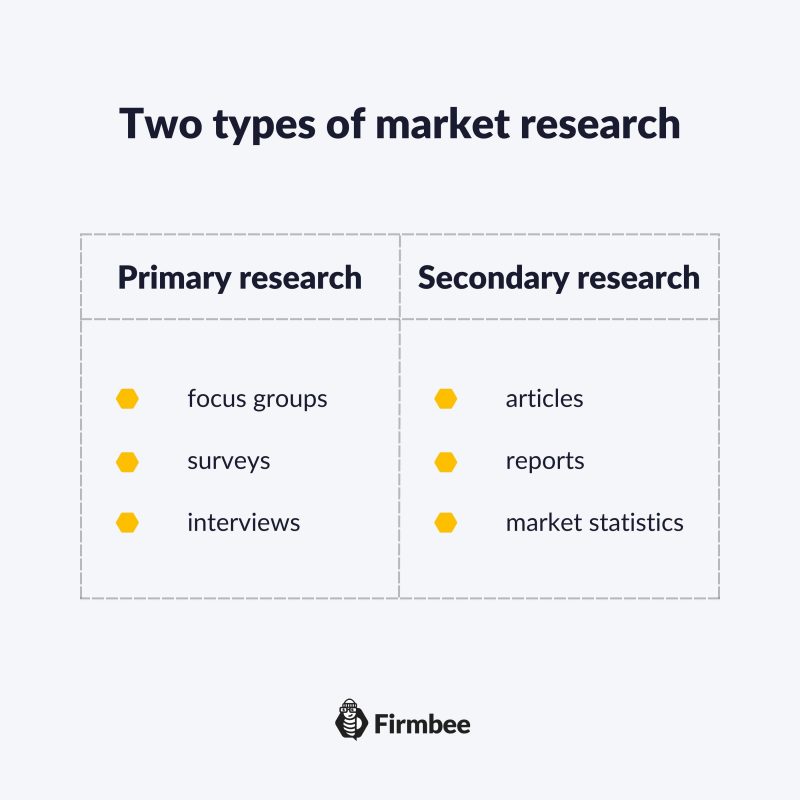A good startup idea is extremely important, but it is necessary to confirm that it has a chance of being implemented. However, this should be done as early as possible to avoid wasting time on an unsuccessful venture. Market research allows would-be entrepreneurs to get the answers they need to make data-driven business decisions. What is market research? Why is it important? Read our article to find out more.
What is market research? – table of contents:
- What is market research?
- Why should you conduct market research?
- How to do market research?
- What now?
- Summary
What is market research?
For starters, it is necessary to explain what market research is. It is nothing more than a market analysis that should include observations of recent market trends, the dynamics of the chosen market, and the analysis of your target group. Market research also involves gathering data about your direct and indirect competitors, and what they are offering.
On the basis of the collected information, you will be able to make smart business decisions. Market research has been used in business for years, and the research methods are being constantly improved. Conducting thorough market research is the best way to validate your business idea. If you do not analyze your target audience in the very beginning, you certainly won’t propel your company to success.

Why is it important to conduct market research?
It is difficult for you to evaluate your business idea objectively. For you, the concept being developed will always be a good one. Such an approach is the best recipe for disaster. Market research is supposed to give you an answer as to whether your idea is promising or not. Why waste time, energy and money offering a product or service that no one needs?
Thanks to market research you will learn how to sell your product to customers, get to know the customers’ buying patterns, and understand the strengths and weaknesses of your competitors.
How to do market research?
You can start from formulating a hypothesis which is usually considered the principal instrument in research. Once it is defined, you can proceed to choose the right research method. There are several available research methods, and the selected one should be tailored to your company’s needs. At this point, a distinction between the primary and the secondary research should be made:
- Primary research. Primary research is the process you conduct yourself or hire someone to do it for you. It involves collecting data directly from representatives of the designated target group. Examples of primary research are as follows: online surveys, focus group interviews, observations, experiments and visits to competitors’ locations.
- Secondary research. In a nutshell, secondary research is about using existing data, such as reports and market statistics. It is usually faster and more affordable than primary research. A great source of information can be the Internet here.
Both primary research and secondary research can be either qualitative or quantitative.

What now?
Once you’ve completed your market research, it’s time to evaluate its results. If the first results are not satisfactory, don’t panic. Remember that too much data might confuse you and lead to inaccurate conclusions. Organize all the information well and analyze it thoroughly. To compliment your previous efforts, create a summary of the findings based on your research and a comprehensive explanation of them.
Summary
Market research provides essential information about your market and prospective customers. It can help you understand their needs and motivations. It allows you to decide whether your business concept will fly or not. For most businesses, market research is a key element in developing a successful marketing strategy.
We’ve just answered the question: What is market research? Want more advice? Read also: 5 creative ideas for a business that require little or no startup capital.
If you like our content, join our busy bees community on Facebook, Twitter, LinkedIn, Instagram, YouTube, Pinterest.
Author: Andy Nichols
A problem solver with 5 different degrees and endless reserves of motivation. This makes him a perfect Business Owner & Manager. When searching for employees and partners, openness and curiosity of the world are qualities he values the most.
Launch your startup:
- What is a startup?
- Pros and cons of creating a startup
- 8 best industries for startups
- Top 5 skills every highly successful startup founder needs
- How to create a startup? 7 simple and easy steps
- 6 essential startup development stages
- How to create a startup growth strategy?
- General startup statistics you need to know
- Startup vs. corporate job. Which is right for you?
- 5 incredible companies that started in a garage
- How to find a business idea?
- How to check if your startup idea already exists?
- How to name a startup? Useful tips and strategies
- How to gain business knowledge quickly? 5 best practices
- Why do startups fail? 6 startup ideas you should avoid
- 5 weird business ideas that made millions
- Top 6 most profitable small businesses
- 7 questions to determine if your business idea is worth pursuing
- What is a buyer persona? 5 benefits of creating a buyer persona
- How to validate your business idea? 3 easy steps
- Should you follow your passion? The importance of passion in business
- What is market reseach and why is it important?
- Using social media in business
- What to do when you have too many business ideas?
- How to write a good problem statement for your startup?
- How to test your business idea for real?
- How to create a prototype for a product?
- How to build an MVP?
- How to use surveys for testing your business idea?
- 10 useful tools to validate your business idea
- What is a business plan? 4 types of business plans
- What should be included in a business plan?
- What should a product description include?
- Competitor analysis
- Marketing strategy
- Traditional business plan vs. lean startup plan
- Implementation plan. What is it and how to create it?
- Everything you need to know about patents
- Financial management for startups
- What permits and licenses does my startup need?
- What is the average startup founder salary?
- 4 startup taxes you need to pay
- Which legal structure is best for your business?
- Startup costs. How much money will you need?
- Protection of intellectual property in a startup
- Family funding vs. self-funding
- What is a shareholders’ agreement?
- What should a financial section of a business plan include?


















